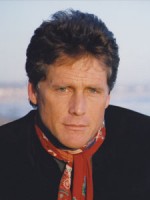Column Name
Title
Leigh McCloskey’s unusual journey can be traced back to the time he missed his cue. “I was in kindergarten and doing a play for a P.T.A. meeting and I missed my entrance,” McCloskey (Drama ’75, Group 6) explains. Ever since then, he has felt a “profound yearning” to get back on stage.
Body
This hunger and consequent exploration has driven McCloskey’s multifaceted career. His Web site identifies him as a modern Renaissance man—an actor, author, and painter. What is remarkable is that most of this wasn’t planned.
McCloskey, 53, acted throughout middle school and high school. Realizing that he needed training, he auditioned for, and was accepted into, Juilliard’s Drama Division. At school, he started painting in order to find a way into the characters he was playing. “I didn’t think of myself as an artist. I just knew I had all these emotions brewing inside me and needed to cultivate all possible conduits,” he says. “Juilliard was enormously informative for me. I was around enthusiastic individuals who loved theater. It was demanding, but it prepared me for the difficult life one faces as a professional actor. It opened unexpected doors.”
Soon after McCloskey graduated from Juilliard, one of these doors led to a major recurring role on the famous soap opera Dallas. However, McCloskey was dissatisfied. “People kept saying I’d made it and I kept thinking, ‘No, this can’t be it.’ I was inwardly discontented.” While working consistently as a TV actor on different shows and gaining public recognition, McCloskey felt that he lacked creative fulfillment. “So I started exploring the nature of creativity,” he reminisces. He began painting more and writing, both in a spontaneous way. “Painting is like acting—you follow a line on a page and it takes you on a journey. It reveals itself to you. I had sketched as a little kid; my dad was a painter. He never allowed me to use an eraser when drawing. I was taught to work with what I had and not worry about perfection.”
McCloskey also began reading in depth about myth and religion: “I asked myself how to bypass the intellectual need to make sense of the creative process.” This quest led to a creative outburst. “I was writing with no predetermined notion—and a new language of hieroglyphs appeared.”
Deeply interested in the psyche and the human mind, he has since written several acclaimed books, including Tarot Revisioned—an exploration of the archetypes of the Tarot—and Adam Born and Eve Restored: A Romance in Two Parts, a re-exploration of the book of Genesis.
This curiosity about the nature of consciousness and creativity led McCloskey and his wife to host biweekly salons in their home, which have been ongoing for almost 27 years. McCloskey elaborates: “They create a space for discussion of Eastern and Western spiritual traditions. I look at human beings as storytellers. After 9/11, something shifted in me. And I thought, if this is the best we can do as storytellers—lead an apocalyptic movement—then we’re failing our history and our tradition. I’m not out to change the world, but if, where I live, I can create the space for discussion, for nourishment, then I am helping those who want to realize that this is why being human is significant. Being human is about assisting, planting a garden, a philosophical seed. Change comes from ideas, not war.”
McCloskey has studied these ideas—both arcane and modern—in depth, and is in demand as a lecturer and scholar of humanistic, philosophical traditions. His deep faith in man’s imagination seems unfettered. He appears to have gleaned creative energy from every major milestone in his life; the births of his daughters led to huge spurts of painting and writing. “None of this was premeditated; it was just a by-product of ideas and exploration,” he says.
His creative exploration has resulted in ventures as diverse as the Grimoire (a book of spells originally created for the film Shadow of the Vampire and now touring with the Rolling Stones on their Bigger Bang Tour), and his “wonder study.” The latter is an entire room whose walls, pillars, ceiling, floor, furniture, and books have been transformed into a giant canvas—every facet of which is symbolic and metaphorical. If one wears three-dimensional glasses, the room appears to be multidimensional, with infinite depth and height.
“Sometimes I feel like a kid who’s planted a magic bean,” muses McCloskey. “I don’t know what’s going to emerge next. I love acting and am honored to be a part of a tradition which makes people consider their own humanity. I am interested in things that have a creative fullness. My success as an actor has given me the freedom to pursue my creative urges. I am going to ride the waves of possibility and see what emerges.”





